BusinessEurope Headlines No. 2021-28
How the Trade and Technology Council can respond to economic and security challenges
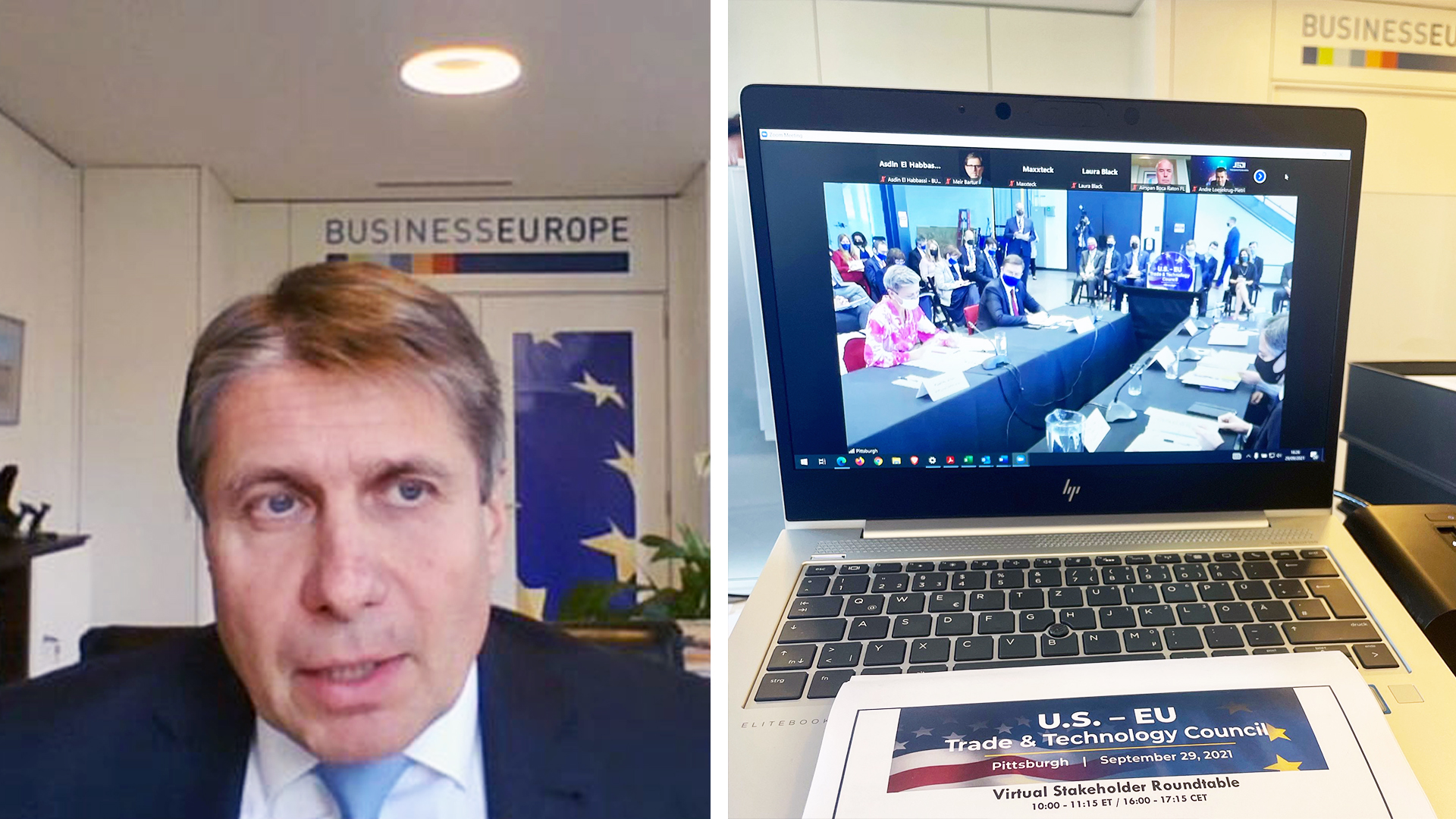
On 29 September, BusinessEurope Director General Markus J. Beyrer participated in the first stakeholder roundtable organised back-to-back to the inaugural meeting of the EU-US Trade and Technology Council (TTC), held in Pittsburgh, USA. Speaking on the panel dedicated to how the TTC can respond to economic and security challenges, Beyrer referred to overcapacities and market distortive subsidies, mainly originating in non-market economies. “We need to update the multilateral rulebook and put on the table concrete proposals to address distortive industrial subsidies and the role of state-owned enterprises”, he said. Referring to the security of supply chains, Beyrer cautioned against increasing production capacity to build resilience: “the TTC should identify common vulnerabilities or dependencies, for instance dependencies on critical minerals, and the EU and the USA should be working together to address them, for instance through diversification strategies”. He added that working together will hopefully prevent upcoming overcapacities and the duplication of investments that would not benefit companies in the EU or the USA. “In this context, we should also be mindful of procurement policies and national content requirements that could impact significantly transatlantic supply chains”, Beyrer concluded. See also our press release “Transatlantic business strongly supports the new Trade and Technology Council”.
Taxonomy: can be an opportunity for SMEs but not as it stands
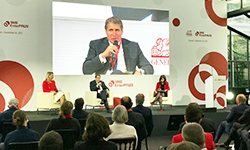 “The taxonomy can be an opportunity for SMEs to channel investment towards green solutions. However, it also sets out a reporting system, which is extremely complex and, to some extent, unclear. It will be tremendously difficult for SMEs to keep up with the burdensome reporting system of taxonomy as it stands, as they often don’t have the technical and human capacity to do so”, said BusinessEurope Director General Markus J. Beyrer at the SME EnterPRIZE event “SMEs: Drivers of Sustainable Economic Recovery and Growth in Europe”, organised by Generali on 28 September in Brussels. Speakers discussed how best to accompany SMEs in their sustainable business transformation, essential to deliver the twin transition to a sustainable and digital economy, while maintaining the competitiveness of the EU at the international level. Mauro Petriccione, Director-General of the European Commission's Directorate-General for Climate Action, MEP Cristian-Silviu Bușoi, Chair of the European Parliament Committee on Industry, Research and Energy, MEP Eva Kaili, Chair of the Panel for the Future of Science and Technology (STOA) and Bianca Dragomir, CEO of Avaesen, also participated. The debate was followed by an Award Ceremony of seven European “Sustainability Heroes”: entrepreneurs who have implemented notable sustainability initiatives in their business activities that can become an inspirational model for fellow entrepreneurs and be ambassadors of sustainability.
“The taxonomy can be an opportunity for SMEs to channel investment towards green solutions. However, it also sets out a reporting system, which is extremely complex and, to some extent, unclear. It will be tremendously difficult for SMEs to keep up with the burdensome reporting system of taxonomy as it stands, as they often don’t have the technical and human capacity to do so”, said BusinessEurope Director General Markus J. Beyrer at the SME EnterPRIZE event “SMEs: Drivers of Sustainable Economic Recovery and Growth in Europe”, organised by Generali on 28 September in Brussels. Speakers discussed how best to accompany SMEs in their sustainable business transformation, essential to deliver the twin transition to a sustainable and digital economy, while maintaining the competitiveness of the EU at the international level. Mauro Petriccione, Director-General of the European Commission's Directorate-General for Climate Action, MEP Cristian-Silviu Bușoi, Chair of the European Parliament Committee on Industry, Research and Energy, MEP Eva Kaili, Chair of the Panel for the Future of Science and Technology (STOA) and Bianca Dragomir, CEO of Avaesen, also participated. The debate was followed by an Award Ceremony of seven European “Sustainability Heroes”: entrepreneurs who have implemented notable sustainability initiatives in their business activities that can become an inspirational model for fellow entrepreneurs and be ambassadors of sustainability.
Contact: Daniele Olivieri
EU needs to be strategic and consistent with key trading partners
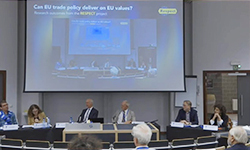 “The EU needs to talk with one voice, deliver a consistent message and develop a clear strategy when dealing with key trading partners like China or the USA. If we appear divided, sending contradictory messages and constantly changing our key priorities we will diminish our negotiation leverage and credibility”, said Luisa Santos, Deputy Director General of BusinessEurope, in a panel discussion on EU, USA and China at a public event that took place on 27 September. The event aimed at disclosing the main research outcomes from the Respect project “Can EU trade policy deliver on EU values”. Talking specifically about EU-China relations, Santos said: “We understand the difficult moment in EU-China relations following the imposition of sanctions on both sides. However, the EU needs to continue to engage and have official dialogues with China at high level”. She highlighted that China is a major trade and investment partner of the EU and we cannot afford a situation where the two sides don’t have a forum to discuss problems but also areas of joint interest and cooperation. “This is important from an economic but also geostrategic point of view”, Santos concluded.
“The EU needs to talk with one voice, deliver a consistent message and develop a clear strategy when dealing with key trading partners like China or the USA. If we appear divided, sending contradictory messages and constantly changing our key priorities we will diminish our negotiation leverage and credibility”, said Luisa Santos, Deputy Director General of BusinessEurope, in a panel discussion on EU, USA and China at a public event that took place on 27 September. The event aimed at disclosing the main research outcomes from the Respect project “Can EU trade policy deliver on EU values”. Talking specifically about EU-China relations, Santos said: “We understand the difficult moment in EU-China relations following the imposition of sanctions on both sides. However, the EU needs to continue to engage and have official dialogues with China at high level”. She highlighted that China is a major trade and investment partner of the EU and we cannot afford a situation where the two sides don’t have a forum to discuss problems but also areas of joint interest and cooperation. “This is important from an economic but also geostrategic point of view”, Santos concluded.
Contact: Luisa Santos
Understanding taxonomy reporting requirements
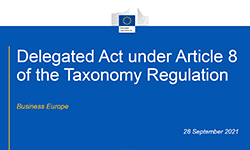 On 28 September, BusinessEurope organised a technical workshop on taxonomy disclosures, as laid down in the Art. 8 Delegated Act. The workshop included a number of national federations, corporates and industrial sector representatives and focused on the taxonomy’s non-financial corporate reporting. The European Commission adopted the rules for companies on taxonomy reporting last July. If the European Parliament and the Council give their green light to the text, then companies will start publishing their taxonomy reports from next year. “Considering the time for preparation is short and the questions that companies have are still many, we felt necessary to organise this workshop”, said Alexandre Affre, Deputy Director General of BusinessEurope, adding that “we invite the Commission to present its written guidance as soon as possible and to establish a help desk to support companies in their reporting exercises”.
On 28 September, BusinessEurope organised a technical workshop on taxonomy disclosures, as laid down in the Art. 8 Delegated Act. The workshop included a number of national federations, corporates and industrial sector representatives and focused on the taxonomy’s non-financial corporate reporting. The European Commission adopted the rules for companies on taxonomy reporting last July. If the European Parliament and the Council give their green light to the text, then companies will start publishing their taxonomy reports from next year. “Considering the time for preparation is short and the questions that companies have are still many, we felt necessary to organise this workshop”, said Alexandre Affre, Deputy Director General of BusinessEurope, adding that “we invite the Commission to present its written guidance as soon as possible and to establish a help desk to support companies in their reporting exercises”.
Contact: Carolina Vigo
Key messages to the Competitiveness Council
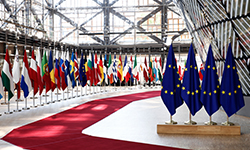 On the occasion of the EU competitiveness ministers’ meeting held on 29 September, BusinessEurope addressed the Council Presidency and all EU Member States with a letter calling for reinforced coordination of policies that affect the industry and services basis in Europe. As ministers exchanged views on the tabled Fit for 55 package, BusinessEurope acknowledged the overall huge impact of the package on the economy, both in terms of opportunities it could create and cost and technology challenges at stake. We also reflected on the Council’s debate about the latest European Commission policy framework for better regulation and actions on removal of barriers in the EU Single Market. Both issues remain among the top priorities for the business community. BusinessEurope’s message bridging yesterday’s Council agenda points: green and digital transition needs Single Market and better regulation.
On the occasion of the EU competitiveness ministers’ meeting held on 29 September, BusinessEurope addressed the Council Presidency and all EU Member States with a letter calling for reinforced coordination of policies that affect the industry and services basis in Europe. As ministers exchanged views on the tabled Fit for 55 package, BusinessEurope acknowledged the overall huge impact of the package on the economy, both in terms of opportunities it could create and cost and technology challenges at stake. We also reflected on the Council’s debate about the latest European Commission policy framework for better regulation and actions on removal of barriers in the EU Single Market. Both issues remain among the top priorities for the business community. BusinessEurope’s message bridging yesterday’s Council agenda points: green and digital transition needs Single Market and better regulation.
![]() Contact: Martynas Barysas
Contact: Martynas Barysas
Automated decision-making: debate on regulatory frameworks
 On 27 September, the European Parliament’s Internal Market and Consumer Protection Committee (IMCO) held its public hearing on automated decision-making (ADM) and consumer protection in a modern economy. Committee members exchanged views on this very broad topic with the invited stakeholders and academia, reflecting on how the existing and proposed regulatory frameworks contribute to the development of the digital economy and create a trusted environment for consumers.
On 27 September, the European Parliament’s Internal Market and Consumer Protection Committee (IMCO) held its public hearing on automated decision-making (ADM) and consumer protection in a modern economy. Committee members exchanged views on this very broad topic with the invited stakeholders and academia, reflecting on how the existing and proposed regulatory frameworks contribute to the development of the digital economy and create a trusted environment for consumers.
BusinessEurope Director for Internal Market, Martynas Barysas, shared comments in the panel with the European Consumer Organisation (BEUC), and the Testing Inspection and Certification Council (TIC). Issues of market access conditions for products and services that are ADM-enabled, safety, transparency and oversight of ADM, and consumer protection were addressed. “We support the endeavour to create a trusted environment for consumers and ensure a human-centric approach in ADM, including the application of Artificial Intelligence (AI); however, numerous conditions apply to get this right”, Barysas said. He cited the necessary conditions of a risk-based approach, transparency that is proportionate to the objective and meaningful for the consumer, and the protection of commercially sensitive information such as trade secrets.
On the safety of the ADM-enabled products and services, he stressed that regulators should not aim at rigidly prescriptive rules which will not sustain the tech development pace. Only essential safety requirements should find their way into the law. At the same time, the industry know-how should be employed for the development of technical solutions through a well-established standardisation process. Barysas pointed out that trusted public-private interplay is inevitable if Europe wants to succeed. Every new requirement in regulations puts immense pressure on Europe’s conformity assessment and market surveillance infrastructure, as it requires top-level expertise.
“Consequently, weak (on specifics of ADM) market surveillance authorities would undermine trust on both sides – consumer and business. Europe should avoid it at all costs”, he concluded.
Contact: Martynas Barysas
UN Guiding Principles on Business and Human Rights: more focus on states’ implementation needed
 As part of the consultation on the roadmap for the next 10 years of the United Nations Guiding Principles on Business and Human Rights (UNGPs), the business community has come together to highlight their ongoing commitment and engagement on the UNGPs, as the authoritative global framework on human rights. BusinessEurope, the International Organisation of Employers and Business at OECD (BIAC) point to ever-increasing efforts of business to deepen the implementation of the UN Guiding Principles and innovative ways to address challenges. However, pillar One of the Protect-Respect-Remedy framework, the state duty to protect human rights, remains an untapped opportunity. Strengthening accountability of governments’ implementation of the UNGPs remains critical, including strengthening local leadership and capacity to tackle fundamental human rights issues. To move the human rights agenda forward, solutions to tackle the root causes of human rights challenges must gain the spotlight in the upcoming roadmap, also bearing in mind that many of these issues are beyond what individual companies can resolve.
As part of the consultation on the roadmap for the next 10 years of the United Nations Guiding Principles on Business and Human Rights (UNGPs), the business community has come together to highlight their ongoing commitment and engagement on the UNGPs, as the authoritative global framework on human rights. BusinessEurope, the International Organisation of Employers and Business at OECD (BIAC) point to ever-increasing efforts of business to deepen the implementation of the UN Guiding Principles and innovative ways to address challenges. However, pillar One of the Protect-Respect-Remedy framework, the state duty to protect human rights, remains an untapped opportunity. Strengthening accountability of governments’ implementation of the UNGPs remains critical, including strengthening local leadership and capacity to tackle fundamental human rights issues. To move the human rights agenda forward, solutions to tackle the root causes of human rights challenges must gain the spotlight in the upcoming roadmap, also bearing in mind that many of these issues are beyond what individual companies can resolve.
![]() Contact: Rebekah Smith
Contact: Rebekah Smith
Climate-neutral transition will require investments and new growth opportunities
 Especially in those regions that will be hardly hit by the upcoming transition towards a climate-neutral economy, it is crucial to mobilise investments and remove barriers to growth so that new jobs can be created. At the same time, we must work towards a truly global level playing field, making and keeping European companies that strive towards climate neutrality competitive. Those were the key messages that BusinessEurope Advisor Steffen Engling shared at a Roundtable on Bulgaria’s Industrial Transition organised by the Institute for Sustainable Transition and Development at Trakia University on 24 September. The lively discussion was enriched by the case study of the Stara Zagora region, where lignite mining and electricity production play a large role, and which will face deep and lasting changes in the coming decades. Valuable insights on the developments on the ground as well as the European framework were given by representatives of the local, European and International Trade Union movements as well as ministers of the Bulgarian Government, and the European Commission Executive Vice-President for the European Green Deal, Frans Timmermans.
Especially in those regions that will be hardly hit by the upcoming transition towards a climate-neutral economy, it is crucial to mobilise investments and remove barriers to growth so that new jobs can be created. At the same time, we must work towards a truly global level playing field, making and keeping European companies that strive towards climate neutrality competitive. Those were the key messages that BusinessEurope Advisor Steffen Engling shared at a Roundtable on Bulgaria’s Industrial Transition organised by the Institute for Sustainable Transition and Development at Trakia University on 24 September. The lively discussion was enriched by the case study of the Stara Zagora region, where lignite mining and electricity production play a large role, and which will face deep and lasting changes in the coming decades. Valuable insights on the developments on the ground as well as the European framework were given by representatives of the local, European and International Trade Union movements as well as ministers of the Bulgarian Government, and the European Commission Executive Vice-President for the European Green Deal, Frans Timmermans.
Contact: Steffen Engling
Eastern Partnership: fit for the future
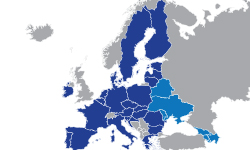 “BusinessEurope supports the European Commission’s approach for a post-2020 Eastern Partnership, adopted in July 2021 and we hope that the Eastern Partnership Summit that will take place at the end of the year will operationalise this plan, both in supporting good governance practices as well in mobilising investments”, said Sofia Bournou, Senior Adviser at BusinessEurope’s International Relations department, at a panel discussion on the EU’s Eastern Partnership, during a meeting of the external relations section of the European Economic and Social Committee on 28 September. Launched in 2009, the Eastern Partnership brings together the EU and six Eastern Partnership countries (Armenia, Azerbaijan, Belarus, Georgia, Moldova and Ukraine). The Eastern Partnership has developed in a way that takes into account the different levels of ambition of these partners when it comes to being associated with the EU. This very much reflects the challenging political reality in some of these countries. BusinessEurope supports this differentiated, tailor-made approach by the European Commission and anticipates that the Summit will address how it can be further promoted, especially in the context of the Association Agreements that Georgia, Moldova and Ukraine – partners that wish to be in a closer relationship with the EU – have signed with the EU.
“BusinessEurope supports the European Commission’s approach for a post-2020 Eastern Partnership, adopted in July 2021 and we hope that the Eastern Partnership Summit that will take place at the end of the year will operationalise this plan, both in supporting good governance practices as well in mobilising investments”, said Sofia Bournou, Senior Adviser at BusinessEurope’s International Relations department, at a panel discussion on the EU’s Eastern Partnership, during a meeting of the external relations section of the European Economic and Social Committee on 28 September. Launched in 2009, the Eastern Partnership brings together the EU and six Eastern Partnership countries (Armenia, Azerbaijan, Belarus, Georgia, Moldova and Ukraine). The Eastern Partnership has developed in a way that takes into account the different levels of ambition of these partners when it comes to being associated with the EU. This very much reflects the challenging political reality in some of these countries. BusinessEurope supports this differentiated, tailor-made approach by the European Commission and anticipates that the Summit will address how it can be further promoted, especially in the context of the Association Agreements that Georgia, Moldova and Ukraine – partners that wish to be in a closer relationship with the EU – have signed with the EU.
Contact: Sofia Bournou
Calendar 
- 10 October: EBA@10 Conferece
- 20-22 October: European Forum for New Ideas 2021
- 23 October: 5th EU-GCC Business Forum
- 25-29 October: EU Sustainable Energy Week
- 31 October - 12 November: United Nations Climate Change Conference (COP26)
Not yet a subscriber? Register here.
Reminder: please have a look at our privacy policy